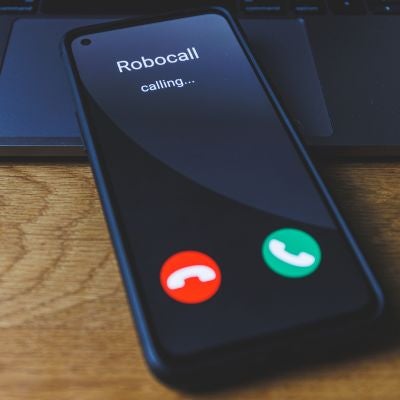
A robocall is a call made with an auto dialer or a prerecorded or artificial voice. While many robocalls are scams or nuisance calls, others are legal whether they are wanted or unwanted, such as appointment reminders, prescription pickups or school closings. As technology advances, scammers can make millions of calls easily and cheaply. The calls come from inside and outside the United States. Some are from legitimate businesses, but some are linked to illegal operations.
Legal robocalls to wireline home phones include:
- Telemarketing sales calls with prior written or oral consent (between the hours of 8 a.m. and 9 p.m.).
- Market research, polls, non-profit solicitations when caller is identified and includes contact phone number.
Legal robocalls to wireless phones include:
- Telemarketing sales calls with prior written consent (between the hours of 8 a.m. and 9 p.m.).
- Reminder calls from pharmacies or notifications from schools or utilities when prior consent is given.
- Prior written or oral consent is required for all calls except emergency calls -- so, market research, polls, political surveys and non-profit
solicitations are not allowed if autodialed or prerecorded.
What should you do if you suspect a call is a robocall or scam:
- Only answer known numbers
- Do not rely on Caller ID - Robocallers can "spoof" their number to make it look like they're calling from a different number. They will often use 304 and 681 area codes to entice West Virginians to answer.
- Verify the identity of the caller - even if they claim to be a government agency or company you do business with, hang up and call them back with a number you have on file
- If you suspect a scam, do not talk, do not press any buttons - just hang up. Engaging can result in more unwanted calls.
- Never share or confirm personal information - such as your Social Security, Medicare numbers or banking information. Legitimate institutions will not call you to request this type of information.
Report calls you receive to:
- WVAGO 800-368-8808
- Federal Trade Commission 877-382-4357
- Federal Communications Commission 888-225-5322
- Do not call registry: 888-382-1222
The National Do Not Call Registry offers free registration services for consumers, to prevent telemarketers from calling home or mobile phones. You can register online or by calling 888-382-1222. Thirty-one days after you register, if you are still receiving unwanted calls, you may file a report to the Federal Trade Commission online or by calling 1-877-382-4357.
What is our office doing?
West Virginia Attorney General JB McCuskey is part of the Anti-Robocall Litigation Task Force, to crack down on robocalls across the country. We have been meeting with telecom companies, large and small, to discuss solutions and encourage them to implement call authentication technology, participate in traceback efforts and offer effective call blocking tools. We participate in multistate efforts to combat illegal robocalls and will use all available tools and partners to combat the problem.
See the latest efforts here: AG McCuskey launches Operation Robocall Roundup, issues warning letters to 37 telecom companies
